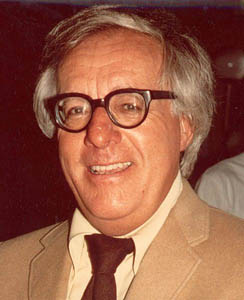During my freshman year of college, I met Ray Bradbury at Earthling Bookstore in Santa Barbara, California. Mr. Bradbury was there signing copies of his newest book, Zen and the Art of Writing, a collection of essays on writing and the creative process.  The line was lengthy, and the wait was considerable, as Mr. Bradbury took his time to chat with everyone who came up for an autograph, getting to know a little about them, trying to make even the briefest of connections with someone who liked his work enough to come and see him. It’s a lesson I’ve never forgotten.
The line was lengthy, and the wait was considerable, as Mr. Bradbury took his time to chat with everyone who came up for an autograph, getting to know a little about them, trying to make even the briefest of connections with someone who liked his work enough to come and see him. It’s a lesson I’ve never forgotten.
When it was my turn to approach him, I stammered something about how much his work meant to me, but Mr. Bradbury wasn’t interested.
“What about you? What are you studying?”
I told him I was an English major, and that I wanted to be a writer.
“Are you writing every day?”
I told him I was, which was true.
“Then you’re already a writer. The key is never to stop.”
He asked me what I wanted to write, and I told him comic books. Mr. Bradbury’s eyes lit up.
“I love comics! I collected Buck Rogers strips as a boy, cut them out of the newspapers!”
I walked away with two things, each that would become more valuable as the years went on: a memory of meeting a literary hero of mine, and a copy of Zen and the Art of Writing.
That copy of Zen and the Art of Writing set next to my typewriter all through college. Typewritten quotes from it hung on the bulletin board above my typewriter, as a reminder and encouragement.
What do you want more than anything else in the world? What do you love, or what do you hate?
Find a character, like yourself, who will want something or not want something, with all his heart. Give him running orders. Shoot him off. Then follow as fast as you can go. The character, in his great love, or hate, will rush you through to the end of the story. The zest and gusto of his need, and there is zest in hate as well as in love, will fire the landscape and raise the temperature of your typewriter thirty degrees.
And this.
You must stay drunk on writing so reality cannot destroy you.
And this.
If you did not write every day, the poisons would accumulate and you would begin to die, or act crazy, or both.
And this.
Writing is supposed to be difficult, agonizing, a dreadful exercise, a terrible occupation.
And above all this.
And what, you ask, does writing teach us? First and foremost, it reminds us that we are alive and that it is a gift and a privilege, not a right.
Today, a simple turn of my head to the left and I can see that same copy of Zen and the Art of Writing in my bookcase, Mr. Bradbury’s eyes watching over me still. And on my desk in front of me every day as I write is a large collection of Mr. Bradbury’s short stories, a gift from a close friend. I don’t crack it open and enjoy it as often as I should; too many small jobs and petty distractions pulling me away. But I find great comfort and inspiration in seeing it there every day.
It reminds me that, like living, writing is a gift and a privilege, not a right.
Ray Bradbury was 91 years old.

Thank you for sharing such treasures with us! We are not always aware, are we, that in each important conversation something– perhaps the only thing– of true value is being passed along. Mr. Bradbury (No, I must say Ray, though I never had the privilege of meeting his physical person) was remarkably present in this time with you, and gave you the gift of great personal guidance, spontaneously and with utmost intentionality. I’d have to imagine that he’d take pride in your choosing to share. (Or, quite likely, takes present pride, from a higher perspective.)
If the man had a defining characteristic, other than a gift for writing with such skill as to re-define the practice, it would have to be huge generosity. Everything I ever knew, or heard him to do, was as a gift to Humanity. He held hope in his heart for our future, understanding that we were all one.
(Anyone else out there remember his short story, “the Powerhouse?” It explains the mystical, and its power for personal transformation, better (by far!)than anything else I’ve ever read.)
I know I am so far from alone in saying “What that man gave to me– the gifts he sent my way, can never be truly or completely tallied.” So I will leave it at that, and say, as I have elsewhere on the Internet: “Thank you, Ray, for everything. Thank you for being nothing but yourself, for staying true to your visions and encouraging anyone who might be listening to do the same.
“Thanks for all of the great reads, in the different seasons of my life.”
Rest in sweet peace. As long as we have words, your name will be honored, and loved.”
Thank you.
Bradbury was a favorite; not just as a writer, but also for his sense of humor. He appeared in a brilliant commercial for Sunsweet Pitted Prunes, created and featuring Stan Freberg. Bradbury appears on a giant monitor behind Freberg (shades of Farenheit 451), as Freberg discusses his predicting pitted prunes in the future. Bradbury is rather confused and repeatedly says something like, “I never said anything about prunes…” I have enjoyed (as a bookseller) seeing Farenheit 451 become required reading for high school. In my day, you had to discover it on your own, as no English teacher (of my acquaintance) ever gave much esteem to science fiction.
Love this! And those quotes are absolutely helpful, inspiring and so true.
Thanks for sharing this story!
I haven’t been writing every day, but I will resume as soon as I decide to stop acting crazy.